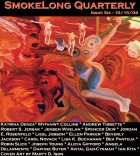We should have let Damian’s old hippie aunt invoke the Goddess at her birth. We should have better instilled a hierarchy of man over beast. We should have taught her how to sprint. We should have kept a fine length of thread attached to her wherever she went.
I don’t know which “should haves” burn with their stinger-like precision through Damian’s peace-of-mind. His mantra has become: “Lucy is fine.”
Yes. Lucy and her nub have adapted.
“Children are the resilient ones,” Dr Moskovitz told us when Lucy came out of surgery a year ago. “It’s the parents who have the difficult time.”
The difficult time. Sounds like an era. The Neanderthal Time. The Paleolithic Time.
We were mindless and numb last year, only Damian held it together, at least for a while.
“That doctor really knows his shit,” he said as we left our child, swaddled in bandages, pale and bloated with anesthetic at his urging that we should rest.
“What will we do? How will she cope?” I asked and stopped eating.
“She just will,” he replied, and began drinking Scotch.
I couldn’t sleep. At work I often placed the wrong volunteers with the wrong sites. I lay awake thinking of all the things she could no longer do, aware that I might never rest again. All because of a dog we never knew existed until he protected his territory from a tiny child picking dandelions off his lawn.
If they were going to take it off, there was only one thing that I could do, the only thing that made sense.
“Can you have it? I don’t think we do that,” the nurse said, looking scared, like we were planning a satanic ritual.
“Now that it’s been…separated…from her,” Damian began, already on their side. “I don’t know, sweetie…”
“Ask the surgeon. Ask the hospital CEO. Ask anyone I will sign anything and everything. I am not leaving here without it!” You should have seen me. Eyes red and blue from lack of sleep and crying. Hair unwashed and alive in witchy spikes. It was late. Nurses at the midnight hour are easily badgered, their defenses down. Surgeons are scared of lawsuits.
I could imagine all too vividly the diminutive limb loaded into the hospital incinerator. The same arm upon which Lucy had drawn, the morning of the attack, three purple flowers with washable magic marker.
“We’ll take it,” I said, as if I was deciding on a piece of jewelry, a salesman’s kit of brushes. “We’ll do what’s necessary.”
Damian looked at me sidelong, a glance full of apprehension.
I would not waste time with explanations: I had no choice. Her arm belonged to us; it was us.
They gave it to us in a surgical cooler with the word HAZARD stuck on in orange tape. We had to fill out paperwork saying that we would, under threat of legal persecution, possible jail time or heavy fines, dispose of it in only one of two ways.
It sat in the backseat. We brought Lucy’s arm home and left the whole girl behind, sleeping off her surgery.
“What are we doing?” Damian wailed. He really wailed, like I’d never known a man to do.
“We leave it up to Lucy.”
“Jesus Melanie, don’t you think she’ll be traumatized?”
That’s when I lost it, when I threw myself at him, tried to bite his shoulder, as if enacting on him what the Doberman had done to her, as if it was his fault for not protecting her. “Don’t you think she’s already traumatized?” I yelled. “She has a right to her own flesh!”
I left red teeth-marks in his shoulder, little bruises that looked like someone had tried to staple his arm back on.
My own right arm burned for months in sympathetic loss.
*
Now, Lucy is six and has become as dextrous with her left arm as she ever was with her right. She loves her nub now that the ghost itching is gone, massaging cream into its scarred surface. But I miss the little hand that gripped its way through the world at first. We take poems and flowers to the special patch of grass at the cemetery where they allowed us to bury it and she tells it what she’s been up to, about books and her favorite teacher, the sandbox and crayons—her own personal metaphysics.
Lucy begged that the dog not be put down, thanked me for keeping her arm so she could say goodbye, suggested we send the surgeon and staff a gift. Her gratitude overwhelms me. Her father doesn’t share thanks. He is pained by the shiny nub at her shoulder that leaves the right side of shirts and dresses limp. He feels guilty for what is not his fault, he blames me for what is not mine, he is angry, he is hurt. He takes Lucy now on the weekends, his new apartment in walking distance from us.
Of course it hurt—his leaving—but I miss him less than I miss her little, perfect, poking, grabbing, bending, beautiful arm.


 The core workshop of SmokeLong Fitness is all in writing, so you can take part from anywhere at anytime. We are excited about creating a supportive, consistent and structured environment for flash writers to work on their craft in a community. We are thrilled and proud to say that our workshop participants have won, placed, or been listed in every major flash competition. Community works.
The core workshop of SmokeLong Fitness is all in writing, so you can take part from anywhere at anytime. We are excited about creating a supportive, consistent and structured environment for flash writers to work on their craft in a community. We are thrilled and proud to say that our workshop participants have won, placed, or been listed in every major flash competition. Community works.